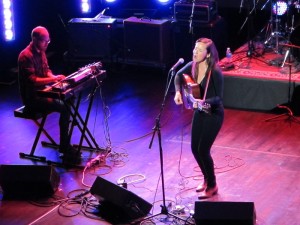This is an expanded version of the story which appeared in our September 23, 2015 issue.
Sarah MacDougall, a Swedish-born singer/songwriter who now calls Whitehorse home, comes with a long list of accolades. For example, her music just won her the West Coast Music Awards Roots Solo Recording of the Year prize (which she’s no stranger to: she also took it home in 2012) for her latest release, Grand Canyon. We sat down with Sarah before this year’s West Coast Music Awards to talk to her about her life and her music.
In the song “Cold Night,” the effects of winter on the landscape seem to mirror the effect of loss on the singer’s heart. Is your artistic process linked to landscape?
Well, that’s a metaphor, but it definitely affects me. That song was written at a time when I was walking a lot. It usually helps me writeŃto walk, and to move. So maybe that’s why the landscape becomes such a big part of the process. I’m not just sitting in a room, I’m actually moving around.
There is a stereotype that Nordic people are strongly influenced or shaped by their landscape. Do you think that the landscapes we inhabit affect the people we become?
I think so. If you’re from a Nordic country you’re always very close to nature. It’s not like if you’re in Toronto, in southern Ontario, where it’s all kind of suburby and ugly everywhere. That’s going to have a very different effect on you than growing up in Iceland, or in the Yukon, or anywhere where you have much more of a closeness to nature.

The themes and undertones of Grand Canyon are dark and brooding. On your website you describe it as having sounds of a “hopeful outsider trying to figure out their place and make sense of the world.” Are you that outsider?
I think I’ve always felt like an outsider in many ways. Growing up in Sweden I had an immigrant parent, and then coming to Canada it was the same. I didn’t understand the humour; I didn’t understand the references. When I’m on tour I’m always on the outside looking in to other people’s lives. So yeah, it’s probably me (laughs).
You also say it’s about fear, hope, love, and forgiveness. What brought you to write this album? Whom did you have to forgive?
Not one specific person. There’s some love stories in there, and there’s forgiving yourself for things that you’ve put yourself through. For me, the record is about figuring out where I am, and who I am. I have these different homes, the Yukon and Sweden, and at the same time I’m never in either. So on purpose I used a lot of Swedish themes on the record. I don’t know why, exactly.
The album opens with “I Want to See the Light,” a song about racist shootings in Malmo. Do you think the world is a darkening place?
I think I felt that when I wrote the song. Europe has been quite dark for the last few years, although I feel a bit more hopeful now. I think a lot of people are overwhelmed, busy in their own worlds and scared. We’re so isolated because we’re constantly on our smartphones, connected in this weird way. With “I Want to See the Light,” I wanted to see more connection and realness.
What is the role of art or the artist in bringing connection or light?
I think that’s a huge part of art. Most of the art I like and think is successful is bringing some kind of light, even if the art is dark, or touching on really serious subjects. It gives you a connection to the world, a reference to history. It lets you know that you’re part of something. And I think art is extremely important in that. Imagine not having any art. That’s a dark world. I can’t even imagine.
